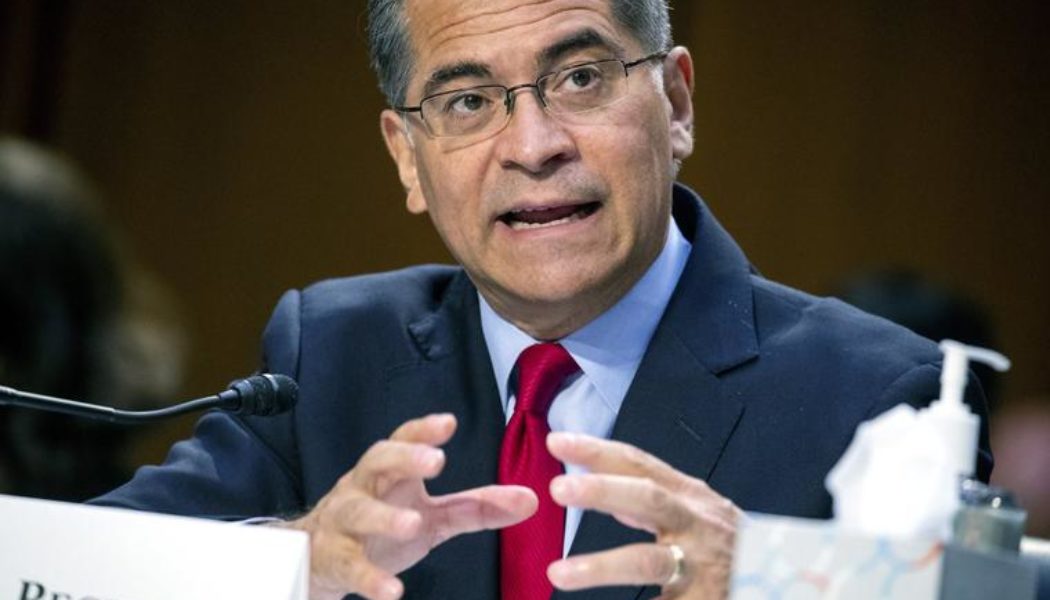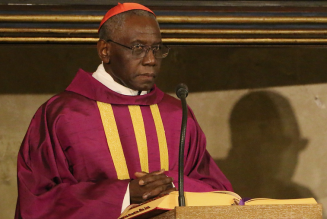
The Biden administration’s Department of Health and Human Services (HHS) is developing new regulations for U.S. health-care law in close consultation with a coalition of activist groups intent on imposing an abortion, end-of-life and sexual-health agenda without religious-freedom exceptions.
The new rule in development has the potential for adverse effects on Catholic employers, but could prove devastating to Catholic health-care providers, including Catholic hospitals that care for one in six hospital patients in the United States.
According to Aug. 13 court filings uncovered by attorneys for the Catholic Benefits Association (CBA), and provided exclusively to the Register, the HHS and its Office of Civil Rights informed the U.S. District Court for the District of Columbia that it was working on a new rule (a set of regulations) that would replace the 2020 “rule” established by HHS under the former Trump administration.
The Catholic Benefits Association’s membership includes 71 dioceses, representing approximately a third of the U.S. dioceses and eparchies, and more than 1,000 affiliated members, such as charities, hospitals, universities and small businesses.
The Trump administration had revised 2016 regulations issued under the Obama administration that required doctors to perform gender-transition surgeries or refer patients for them — despite objections they would have to the procedure — and required insurance coverage for gender-transition surgeries.
A pair of legal cases, in which the Catholic Benefits Association was successfully represented, resulted in permanent injunctions that prohibited the HHS from enforcing abortion and transgender mandates on the association’s members.
However, the Aug. 13 legal filing reveals HHS is working on a new rule that would dispose of the 2020 rule and potentially exceed the 2016 Obama-era regulations by vastly expanding the scope of what discrimination on “the basis of sex” means under the Affordable Care Act (ACA).
Legal Challenge
The HHS brief responded to a legal challenge filed by Whitman-Walker Clinic, a Washington, D.C.-based nonprofit health system with a focus on the “LGBTQI+” community. Whitman-Walker alleged the administration was taking too long to repeal the 2020 rule. But HHS revealed that Whitman-Walker was a party to the health-care task force of activist groups coordinated by the Leadership Conference on Civil and Human Rights that included Planned Parenthood Federation of America, the Southern Poverty Law Center, Center for American Progress, the Human Rights Campaign and others. HHS was discussing with these groups how to change the rule for Section 1557 of the Affordable Care Act, which prohibits discrimination based on sex.
The HHS cited as an exhibit a 73-page Leadership Conference memorandum, dated June 8, 2021, that outlines the task force’s “major concerns” and argues the new rule should embrace an “expansive definition” of discrimination on the basis of sex.
The department’s brief said it could resolve plaintiffs’ claims by revising the rule at issue, which would happen no later than April 2022. “The agency is exploring its substantial and legitimate concerns with the 2020 Rule … and working to promulgate a new rule as soon as possible,” it said, emphasizing the need to respect the integrity of the administrative process.
The government’s filing also stressed that “the prospect of rulemaking that moots Plaintiffs’ claims here is far from theoretical,” pointing to the “substantial and legitimate concerns driving the [HHS] agency’s reconsideration process.”
The federal court agreed on Oct. 13 with the HHS’ position, but ordered the agency to give the court updates on the rulemaking progress every other month beginning Nov. 30.
Leadership Conference Memo
The Leadership Conference claims its memo is not “comprehensive” but is meant “to introduce our major concerns” with how the ACA’s regulations against discrimination “on the basis of sex” in Section 1557 should be revised. At the outset, it says HHS should develop a new rule that not only reflects the Supreme Court’s decision in Bostock v. Clay County, which declared sexual identity should be included under “sex” in nondiscrimination statutes; but it also indicated the HHS had to develop the rule in a way that could roll back the religious exemptions won through litigation and permanent injunctions by Catholic entities, including the CBA, in the Franciscan Alliance and Religious Sisters of Mercy decisions.
Among its demands are mandatory coverage and performance of gender-transition services, including cross-sex hormones, sex-reassignment surgeries, cosmetic surgeries, voice modification and fertility treatments for infertile couples, same-sex couples and some single persons.
The memo also demands fertility treatments not just for infertile couples but for those who are “socially infertile.” The “socially infertile” includes same-sex couples and single persons who cannot “reproduce via sexual intercourse due to social factors [like] lack of a partner or because of a person’s sexual orientation.”
The memo states the HHS should include “termination of pregnancy” as a category under the prohibited discrimination on the basis of sex. It maintains that people who get pregnant are not just women, and so the HHS could require employers to cover contraceptives, abortion-inducing drugs and sterilizations in health plans. The memo cited the matter as urgent, pointing to increased state restrictions on abortion access.
The Catholic Benefits Association stated that if HHS follows the “road map” laid out by the Leadership Conference, all employers of any size with health plans, insurers, self-funded plans, federal funding recipients and their subcontractors, Medicare and Medicaid providers and Catholic hospitals and health-care providers would be affected.
‘No Place to Hide’
Doug Wilson, CEO of the Catholic Benefits Association, told the Register that if HHS were to promulgate a rule that reflected the “major concerns” outlined by the Leadership Conference memo, “it would effectively remove all religious considerations from issues around life, family, marriage, the very nature of men and women.”
“There’s no place to hide from this,” he said. Wilson said what the Leadership Conference outlines “would place Catholic health-care providers in an untenable position,” forcing them to choose between staying in business “or provide services and products that are in direct conflict with our basic Catholic teachings.”
The disruption to the health-care system could be enormous, especially at a time when the COVID-19 pandemic has placed it under tremendous strain. The Leadership Conference’s memo pointed out that the 10 largest Catholic health systems operate 864 urgent-care centers, 385 ambulatory surgical centers and 274 physician groups, among other operations.
“This isn’t a Catholic issue; this is a religious issue,” Wilson said. “This will impact everyone religious, and, essentially, they’re saying that your beliefs have no standing in this discussion.”
Martin Nussbaum, an attorney with Nussbaum Speir Gleason, a Colorado Springs, Colorado-based firm that represents the CBA and specializes in constitutional law, told the Register that the Leadership Conference memo reflects “very powerful activist organizations that have the ear of the government.”
“The earthquake in here is abortion,” Nussbaum said. “They’re saying it has to be covered and it has to be performed.”
The memo also calls for banning “associational discrimination,” so a Catholic hospital, for example, looking to fill a position could not refuse to hire a physician who provided abortions or other medical procedures contrary to Catholic values, Nussbaum explained.
The Leadership Conference of Civil and Human Rights also contends HHS should work with the Justice Department to extend this rule broadly through the whole of government and apply it to all groups of any size that subcontract with the federal government.
Nussbaum said if such a rule envisioned by the Leadership Conference were implemented, the potential sanctions enforced by government or private lawsuits could be devastating: loss of Medicare and Medicaid funding, crippling financial damages, and up to five years’ imprisonment.
Catholic Church Targeted
Critically, the conference’s memo also urges the HHS to disregard prior precedents and the Religious Freedom Restoration Act (RFRA).
“RFRA is not a prophylactic statute that imposes rulemaking requirements on government agencies,” the memo stated.
The memo also takes explicit aim at religious exemptions from government mandates and specifically criticizes the U.S. Conference of Catholic Bishops’ “Ethical and Religious Directives” that govern Catholic health-care providers.
“Religious exemptions have serious and harmful implications,” the memo states. “They were thought of as a way to preserve religious freedom and independence. However, they often come as a societal cost that can impact other community members. Impacts of a religious exemption cannot be siloed from other areas of society.”
The Register reached out to both HHS and Leadership Conference for comment, but none was provided by publication.
Robert Destro, professor of law at The Catholic University of America’s Columbus School of Law who specializes in religious freedom, told the Register the Biden administration is applying the same kind of “whole-of-government” approach that it has currently deployed with respect to vaccines for the COVID-19 pandemic. In that case, the administration denied religious and medical exemptions to its vaccine mandate, which is estimated to apply to 100 million people, including 84 million private-sector workers.
Violation of the Constitution?
Destro said the filing shows two things: The Biden administration is “determined to shift the cost and responsibility of providing what it considers to be ‘essential’ services to the private sector, including religious organizations”; and, second, the administration is “Implacably hostile to any religious-liberty claim that deviates from [its] secular ‘orthodoxy.’”
Destro said the idea that religious accommodations violate the U.S. Constitution’s ban on an established religion “is belied by not only the text of the First Amendment, which protects not only the right to free exercise, but also the right to publicly dissent and to be free of compelled association. It is also undercut by the No Religious Test Clause of Article VI, the nation’s first religious-discrimination law.”
“In effect, the administration is saying that, unless you toe the line — and spend your own money and other resources doing so — you may not participate in (among other things): a) federal programs, b) federal contracting, c) the health-care marketplace, etc.”
“This is going to get way worse before it gets better,” Destro said.
Nussbaum said how the Catholic Benefits Association will be affected depends on the final rule that HHS develops, which will occur after it is initially unveiled and potentially modified following the subsequent comment period.
“We’ll be seeing whether our clients are protected or not,” Nussbaum said, adding they would vigorously litigate any attempt to eliminate Catholic religious freedom in health care.
U.S. Church Concerns
The revelations come as the U.S. Conference of Catholic Bishops is meeting in Baltimore for its annual November assembly.
Archbishop William Lori of Baltimore, the Catholic Benefits Association’s chairman of the board, told the Register that the proposals contained in the government’s brief are “breathtaking in their scope and completely lacking in any religious-freedom provisions.”
“I am very concerned that such rulemaking is now in process,” he said. “I think it is important that dioceses, religious orders and Catholic apostolates of all kinds be aware early on this is coming down the track. And it is not simply about covering things in our insurance plans, objectionable as that is, but it’s also about the providing of [objectionable] services, particularly on the part of our health-care ministries.”
Archbishop Lori criticized that “people who are unaccountable to the electorate” would consider making such “far-sweeping changes and engaging in what appears to be social engineering.”
The archbishop said the First Amendment sought to protect religious belief and practice “from heavy-handed governmental intervention” by allowing people to follow their conscience and their organizations to follow their religious and ethical values.
“When you attack the very idea of religious freedom, as contrary to the First Amendment, you’re really putting everybody’s freedom at risk,” he said. “Freedom of speech and freedom of assembly, all these fundamental freedoms, really travel together.”
The archbishop said threatening one fundamental freedom puts the others at risk.
“It’s a very serious thing,” he said, “and even people who disagree with the Church’s teachings in these various matters should be concerned.”
Join Our Telegram Group : Salvation & Prosperity






